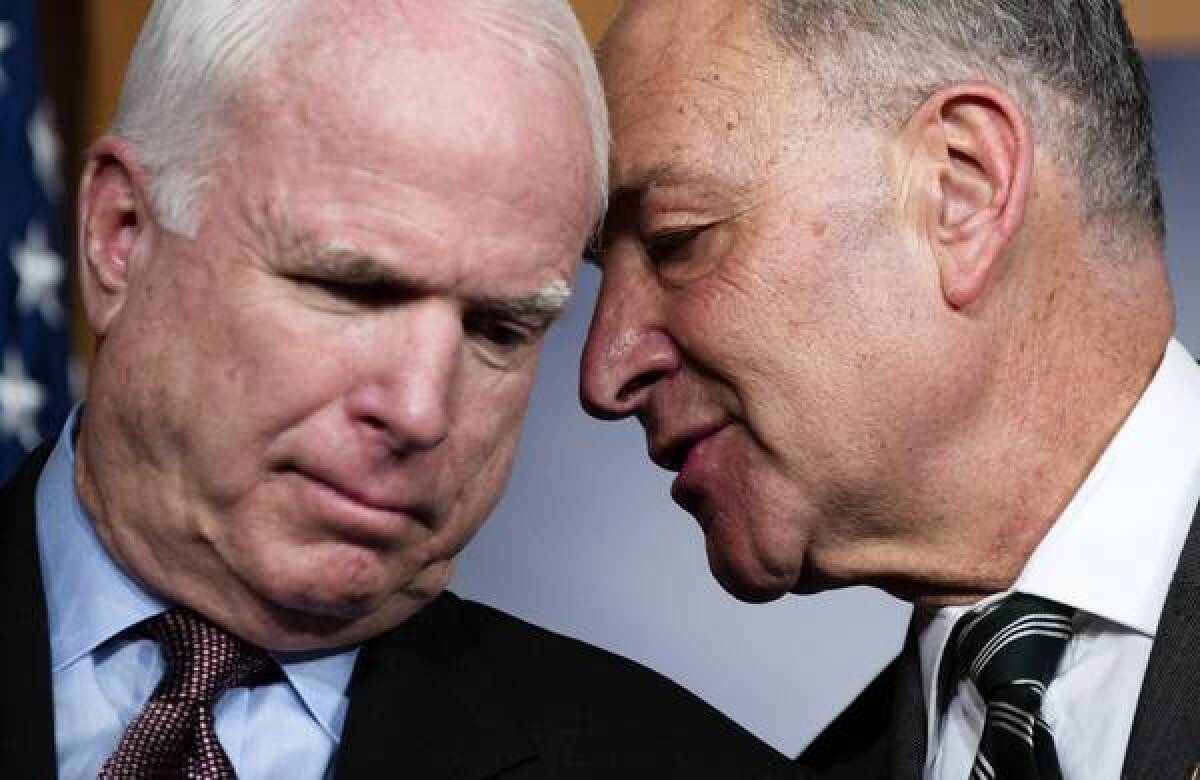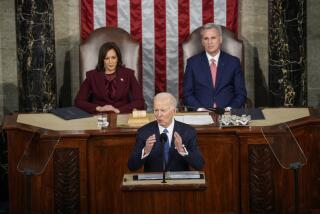Senators unveil bipartisan immigration plan, but opposition looms

WASHINGTON — As they announced their framework for comprehensive immigration reform, leading senators from both parties declared Monday that the politics of the long-stalled debate had shifted after Republican candidates failed to win significant support from the growing Latino electorate in November.
But many conservatives made clear they rejected that contention. They remain deeply skeptical of any plan that would create a way for the estimated 11 million illegal immigrants in the country to become citizens.
“The last time we talked about this in 2007, it sounded very seductive. When we saw the details, it was clear it wouldn’t work,” Sen. Jeff Sessions (R-Ala.) said. Sessions said he was concerned that the Obama administration was not committed to securing the borders to thwart illegal immigration.
On the Senate floor, Sen. David Vitter (R-La.) sounded implacable. “We have history as a guide, and history suggests that this brand of comprehensive reform … is a recipe for failure,” he said.
Twenty-two GOP senators who opposed the failed 2007 plan for immigration reform are still in the Senate, including Minority Leader Mitch McConnell of Kentucky. By contrast, just two of the 12 Republicans who backed it are still in Congress: Sens. John McCain of Arizona and Lindsey Graham of South Carolina.
McCain, who worked on the new compromise, bluntly replied, “Elections,” when asked what improved the outlook in Congress to pass an overhaul. His own history illustrates his point: He was the main GOP advocate for reform in 2007, but he backed off when he ran for president in 2008.
“The Republican Party is losing the support of our Hispanic citizens,” McCain said at a news conference with four other senators. “We realize that there are many issues in which we think we are in agreement with our Hispanic citizens, but this is a preeminent issue with those citizens.”
Sen. Charles E. Schumer (D-N.Y.), who worked with McCain and others on the compromise, agreed that the political environment had shifted. “For the first time ever, there’s more political risk in opposing immigration reform than in supporting it,” he said.
The failure Republican candidates experienced with Latino voters in November has galvanized the attention of party strategists and many elected officials. Advocates for the reform plan hope that a strong bipartisan vote in the Senate, which Schumer predicted, will pressure the House to act.
The immigration blueprint unveiled Monday contains many similarities to the 2007 legislation, including a path to citizenship for immigrants in the country illegally. But the architects of the current plan made a number of adjustments to try to satisfy liberal and conservative critics.
The framework, for example, includes additional steps to enforce border security, a longtime demand by many Republican lawmakers. Sen. Marco Rubio (R-Fla.), who worked on the plan and at times spoke in Spanish during Monday’s news conference, later told a conservative radio host that he would “not support any law that does not ensure the enforcement things happen.”
The support from Rubio, a potential presidential hopeful, is seen as particularly key in bringing others in his party along. But another Latino newcomer, Sen. Ted Cruz (R-Texas), said in a statement that he had “deep concerns with the proposed path to citizenship.”
In the House, some Republicans who have been reluctant to pursue comprehensive reform welcomed the Senate outline, including House Speaker John A. Boehner (R-Ohio), who issued a carefully worded response. But Republican resistance promises to be intense. Many represent districts where any proposal that could be characterized as “amnesty” for illegal immigrants sparks angry opposition.
“It’s one thing for a senator who has a statewide electorate to be able to make the case on this issue. In the House, you have a different demographic base,” said Luke Frans of Resurgent Republic, a conservative research group that has been closely studying the Latino vote.
House conservatives made clear Monday that nothing in the new proposal changed their minds.
“When you legalize those who are in the country illegally, it costs taxpayers millions of dollars, costs American workers thousands of jobs and encourages more illegal immigration,” said Rep. Lamar Smith (R-Texas). “By granting amnesty, the Senate proposal actually compounds the problem by encouraging more illegal immigration.”
Smith was instrumental in stopping earlier attempts to overhaul the immigration system from his former perch as chairman of the House Judiciary Committee. His successor, Rep. Robert W. Goodlatte (R-Va.), handled immigration cases as a private practice lawyer in Roanoke. His voting record on immigration is nearly identical to Smith’s, but Goodlatte did not dismiss the proposal.
“Our nation’s immigration system is in desperate need of repair, and it is not working as efficiently and fairly as it should be,” Goodlatte said, promising to look at the Senate plan.
Most of the Republicans on the committee, including Goodlatte, have consistently voted against bills that would expand the number of immigrants allowed into the country. But some see moves by the House leadership to put calmer voices in key positions as an indication the committee may be more open to engaging in the immigration debate.
“Do I see a change in tone on how they are talking about the issue? Absolutely,” said Alfonso Aguilar, a Republican strategist at the Latino Partnership for Conservative Principles, a Washington-based nonprofit group. “We have the environment where it can happen.”
A bipartisan group of House members also plans to introduce an immigration overhaul bill similar to the Senate proposal before President Obama’s State of the Union address on Feb. 12, a congressional aide said.
White House spokesman Jay Carney welcomed the Senate proposal as “movement and progress.”
On Tuesday, Obama will travel to Las Vegas to push the immigration proposal he outlined in May 2011. He plans to insist that any reform be comprehensive, such as the bipartisan Senate plan, which the president believes tracks with his approach, said aides who requested anonymity to discuss internal White House talks. The president also plans to urge Congress to move swiftly.
Schumer said lawmakers planned to write a bill by March, with a Senate vote by late spring or summer.
Though McCain welcomed the president’s public push for reform, Sen. Dean Heller (R-Nev.) said he worried the president’s involvement could curb support from Republicans.
“If we can keep everybody on the same message and not try to move the ball too much, I think we can get something done in a bipartisan manner,” he said. “But if he tries to move it too far on the left — I just don’t want to lose the support that we have on our side.”
A range of outside groups, including the U.S. Chamber of Commerce and the Service Employees International Union, reacted positively to the Senate plan. But NumbersUSA, a Virginia-based advocacy group that lobbies to reduce immigration levels, dismissed the proposal as “all the same old tired ideas.”
And some immigrant rights groups applauded the proposal but worried that it would make a pathway to citizenship contingent on first securing the border.
“What measurable outcome are they looking for, with respect to being able to say the border is completely secure?” asked Marielena Hincapie, executive director of the National Immigration Law Center in Los Angeles. “Can the border ever be completely secure?”
Cindy Carcamo in Santa Ana and Christi Parsons in Washington contributed to this report.
More to Read
Start your day right
Sign up for Essential California for news, features and recommendations from the L.A. Times and beyond in your inbox six days a week.
You may occasionally receive promotional content from the Los Angeles Times.









